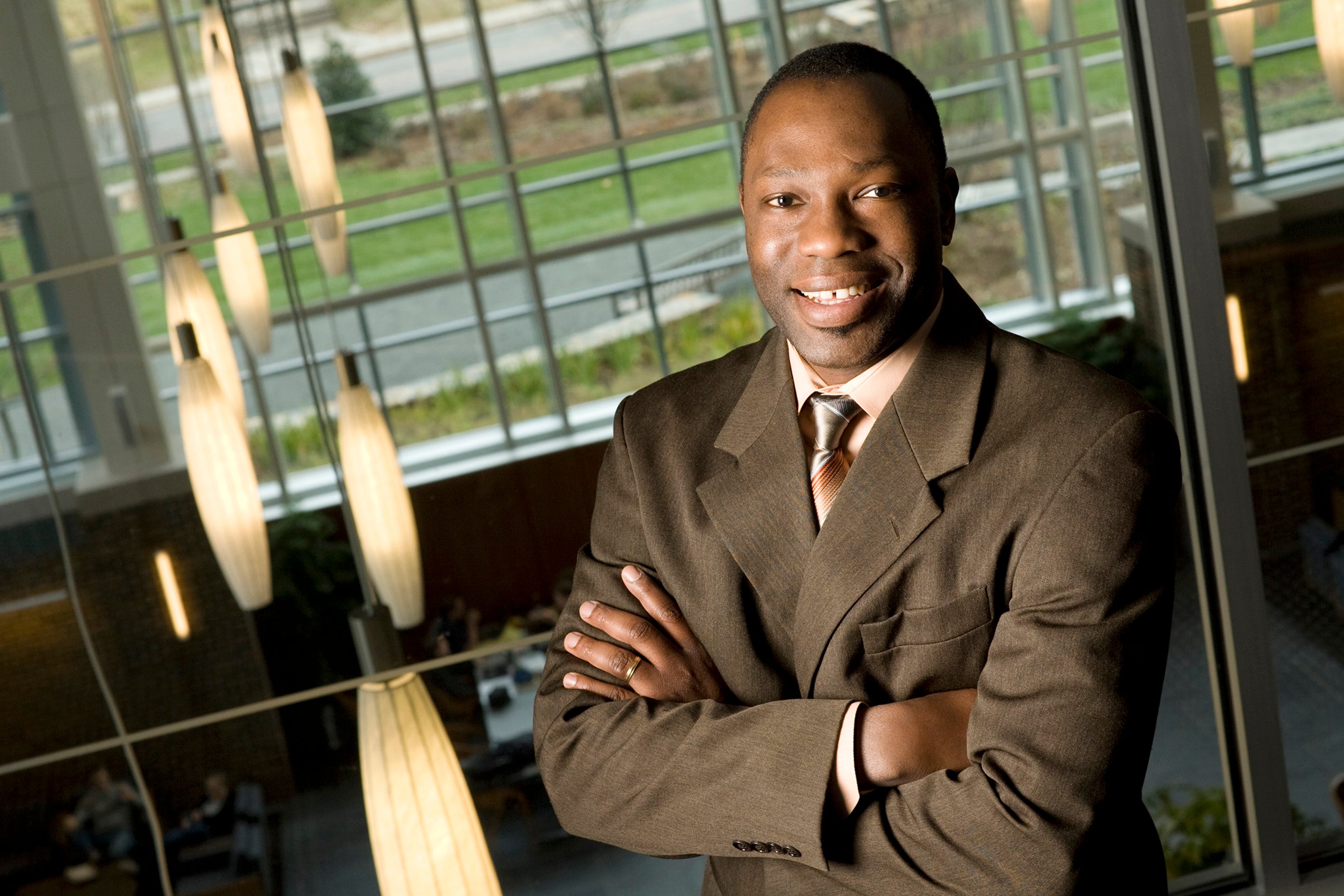Guy-Uriel Charles, an expert in constitutional law, election law, campaign finance, redistricting, politics and race, will join the Harvard Law faculty as the inaugural Charles J. Ogletree, Jr. Professor of Law, effective July 1. He will also serve as faculty director of HLS’s Charles Hamilton Houston Institute for Race and Justice. Professor Charles will also continue, at Harvard, the important programmatic work he and many others do building mentoring networks and resources for prospective and new law professors from underrepresented groups.
Charles currently holds the Edward and Ellen Schwarzman Professorship of Law at Duke Law School, where he co-founded the Center on Law, Race and Politics. A leading authority on the role of law in mediating political power, Charles will hold an endowed chair named in honor of HLS Professor Charles J. Ogletree, Jr. ’78. Ogletree, who dedicated his career to racial equality and social justice, taught at HLS for more than three decades.
During the 2018–2019 academic year, Charles was the Bennett Boskey Visiting Professor of Law at Harvard Law School, where he taught Civil Procedure, Race and Federalism, and Racial Justice and Law. He was awarded HLS’s Student Government Teaching and Advising Award, which recognizes both exemplary instruction and the ability of an instructor to inspire personal and intellectual development outside the classroom.
“Guy-Uriel Charles is a creative, pathbreaking, and impactful scholar whose writing has importantly reimagined the critical relationship among voting rights, race, and democracy in American political systems. Professor Charles is also a superb teacher and mentor who will contribute enormously to our community,” said John F. Manning ’85, the Morgan and Helen Chu Dean and professor of law at Harvard Law School. “I am thrilled to welcome him back to Harvard Law School and to have him serve as the inaugural Charles J. Ogletree, Jr. Professor of Law.”
Charles is currently working on a book with Luis Fuentes-Rohwer, a professor at Indiana University, Bloomington, on the past and future of voting rights. The book argues that the race-based model that underlies the Voting Rights Act has run its course and that the best way to protect against racial discrimination in voting is through a universal, positive-rights model of political participation.
He is also co-editing, with Northeastern University Law Professor Aziza Ahmed, a forthcoming handbook titled “Race, Racism, and the Law,” which surveys the current state of research on race and the law in the United States.
Charles is a frequent public commentator on constitutional law, election law, and race, and he has published more than 30 articles in journals, including the Harvard Law Review, Constitutional Commentary, the Cornell Law Review, the Michigan Law Review, the Michigan Journal of Race and Law, the Georgetown Law Journal, The Journal of Politics, the California Law Review, the North Carolina Law Review, and others.
Charles is also the co-author of two leading casebooks, “Racial Justice and Law” and “Election Law in the American Political System.” In addition, he is the author of two edited volumes, “Race, Reform, and Regulation of the Electoral Process: Recurring Puzzles in American Democracy” and “The New Black: What Has Changed—and What Has Not—with Race in America,”co-written with HLS Professor Kenneth Mack ’91.
“I am very excited to join HLS,” said Charles. “I look forward to becoming an integral part of this intellectual community and working with its tremendous faculty, students, and staff.”
Charles joined the Duke Law faculty in 2009. He was named the Charles S. Rhyne Professor of Law in 2012, and the Edward and Ellen Schwarzman Professor of Law in 2017. He received Duke Law School’s Distinguished Teaching Award in 2016.
Prior to Duke, from 2000 to 2009, Charles taught at the University of Minnesota Law School, where he served as the Russell M. and Elizabeth M. Bennett Professor of Law and as the interim co-dean from 2006 to 2008. At Minnesota, he was named the Stanley V. Kinyon Teacher of the Year for 2002–2003.
At Harvard Law School, he will teach Civil Procedure, Constitutional Law, Election Law, and Race and the Law and other courses and seminars in those areas.
Charles received his J.D. from the University of Michigan Law School and clerked for the Hon. Damon J. Keith of the U.S. Court of Appeals for the 6th Circuit. While at the University of Michigan, he was among a group of students who founded the Michigan Journal of Race & Law and he served as the journal’s first editor-in-chief. From 1995-2000, he was a graduate student in political science at the University of Michigan. He earned a B.A. in political science from Spring Arbor University in 1992.
A member of the American Law Institute, he is a past member of the National Research Commission on Elections and Voting and the Century Foundation Working Group on Election Reform. He has served as the director of the Institute for Law & Politics, a senior fellow in Law and Politics at the Institute on Race and Poverty, and a law school faculty affiliate at the Center for the Study of Political Psychology, University of Minnesota.
